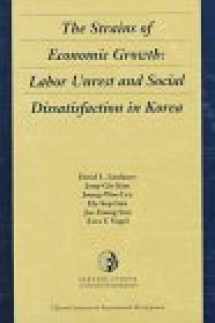
The Strains of Economic Growth: Labor Unrest and Social Dissatisfaction in Korea (Harvard Studies in International Development)
ISBN-13:
9780674839816
ISBN-10:
0674839811
Edition:
First Edition
Author:
Ezra F. Vogel, David L. Lindauer, Jong-Gie Kim, Joung-Woo Lee, Hy-Sop Lim, Jae-Young Son
Publication date:
1997
Publisher:
Harvard Kennedy School
Format:
Hardcover
194 pages
FREE US shipping
on ALL non-marketplace orders
Marketplace
from $13.11
USD
Marketplace offers
Seller
Condition
Note
Seller
Condition
Used - Good
Ex-library.
Book details
ISBN-13:
9780674839816
ISBN-10:
0674839811
Edition:
First Edition
Author:
Ezra F. Vogel, David L. Lindauer, Jong-Gie Kim, Joung-Woo Lee, Hy-Sop Lim, Jae-Young Son
Publication date:
1997
Publisher:
Harvard Kennedy School
Format:
Hardcover
194 pages
Summary
The Strains of Economic Growth: Labor Unrest and Social Dissatisfaction in Korea (Harvard Studies in International Development) (ISBN-13: 9780674839816 and ISBN-10: 0674839811), written by authors
Ezra F. Vogel, David L. Lindauer, Jong-Gie Kim, Joung-Woo Lee, Hy-Sop Lim, Jae-Young Son, was published by Harvard Kennedy School in 1997.
With an overall rating of 3.5 stars, it's a notable title among other
books. You can easily purchase or rent The Strains of Economic Growth: Labor Unrest and Social Dissatisfaction in Korea (Harvard Studies in International Development) (Hardcover) from BooksRun,
along with many other new and used
books
and textbooks.
And, if you're looking to sell your copy, our current buyback offer is $0.3.
Description
By the mid-1980s, Korea's economic and political situation was becoming volatile. Labor relations were especially contentious. The Strains of Economic Growth, a collaborative research project between the Harvard Institute for International Development and the Korea Development Institute provides an analytic history of the economic causes of the labor unrest and popular discontent of the late 1980s. Set against rapid increases in wages and employment, worker dissatisfaction is traced to patterns of income inequality and to non-pecuniary dimensions of working life, including the suppression of labor organizations. The desire for greater political freedom also played an important role in the unprecedented unrest of this period. The conclusions of this volume are essential for understanding the labor struggles that continue in Korea today and are highly relevant for policy makers from other emerging economies that wish to benefit from both the successes and failures of Korea's experience.


We would LOVE it if you could help us and other readers by reviewing the book
Book review

Congratulations! We have received your book review.
{user}
{createdAt}
by {truncated_author}


